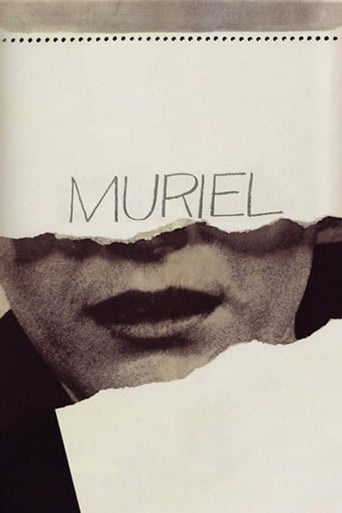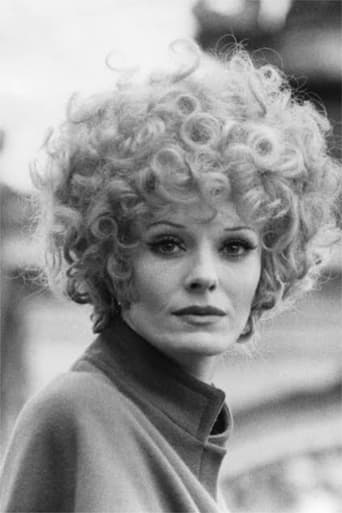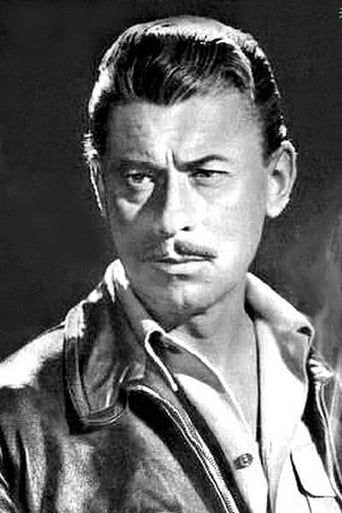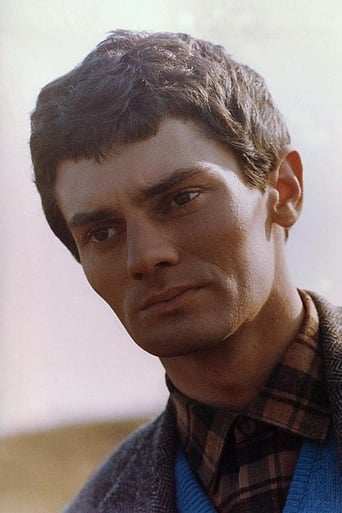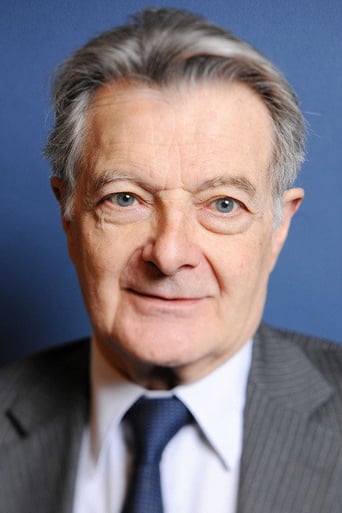Nonureva
Really Surprised!
MamaGravity
good back-story, and good acting
Matrixiole
Simple and well acted, it has tension enough to knot the stomach.
HottWwjdIam
There is just so much movie here. For some it may be too much. But in the same secretly sarcastic way most telemarketers say the phrase, the title of this one is particularly apt.
Sindre Kaspersen
French avant-garde and former French New Wave director Alain Resnais' third feature film which succeeded his highly acclaimed first feature film "Hiroshima Mon Amour" (1959) and "Last Year at Marienbad" (1961), was written for the screen by French poet Jean Cayrol (1911-2005) and tells the story about a middle-aged antique dealer named Hèlène Aughain who lives in her inner-city apartment in the provincial port-town of Boulogne-sur-Mer with her restless and secretive stepson Bernard who is haunted by a woman from his past named Muriel. Their lives changes when Hèlène is visited by her old lover Alphonse Noyard who has brought along a young woman named Francoise.Masterfully directed by one of the greatest directors in cinema history, this character-driven and dialog-driven mystery, a metaphysical drama with rigorously composed visuals and sounds, about memories of love and war, where the past and the present is intertwined and where time dissolves, is a detailed and realistic portrayal of everyday life in a urban French town, a character in itself, where things much like the central characters are incomplete. Like Jean-Luc Godard's "Le Petit Soldat" (1960), Alain Resnais' film pointedly deals with themes of the Algerian War of Independence which had ended the year before "Muriel, or the Time of a Return" was released.The efficient use of cinematic devices and the creatively fragmented narrative is pivotal in this stringently structured and acutely written story, which is an enchantingly atmospheric and cryptic chamber piece with memorable acting performances. Like some of the greatest films made by directors Alfred Hitchcock (1899-1980) and Luis Buñuel (1900-1983), this symbolic, metaphorical and distinctly stylistic early nineteen sixties French-Italian co-production gradually decodes the consciousness of it's characters. A truly engaging and elusive depiction of the human psyche which was awarded with the Volpi Cup for Best Actress - Delphine Seyrig (1932-1990) at the 24th Venice Film Festival in 1963.
chaos-rampant
Resnais is one of the seven sages of cinema, perhaps even one of the most important ones. Within him we find others, like Godard and Marker, who inherited the problems he first posited with clarity of vision and eloquence of mood. Problems of memory, firstly how the past forms manifest in consciousness and synthesize an illusionary space which we then inhabit (in itself a poignant inspection of the mechanisms of cinema), more importantly what these past forms are, which we understand as the self and identity, and how they trap us in meaningless dilemmas.His astounding contribution to this field, is in how he brilliantly envisions this space by means of a visual vocabulary and how he articulates within it. The museum in Hiroshima (which reappears here again, as homage), the hotel in Marienbad.We find the wandering of memory again in Muriel, in a form a tad less inspired this time than those films.Passions past and present, which defined the participants as persons and left indelible marks on their souls, we see how they appear again after time. We see these people use memory as the only means of reliving time, of painfully trying to claim again the ethical vindication that escaped them the first time. How this past, projected in their minds, appears again around them to trap them anew. And we see how, their lives stifled as a result of those past anxieties, the memory of these things points at no way out.The characters in this are fittingly restless, always rushing particularly nowhere, actually running from things they won't admit. Running perhaps against all hope that they will face them again. Moments of reflection are burdened with half-remembered sadness, while life outside continues indifferently.Entire scenes of this play out as they would in ordinary melodrama, then the narrative seems to break down for a time. Virtually recalling fragments of images and conversations which mean nothing, we become privy to the destructive powers of memory. We actually experience the disorientation as part of the movie. But Muriel lacks something in comparison to those other films. Perhaps it's the political angle (re the Algiers conflict and how it resonates in a complacent French bourgeois society), which in previous Resnais films is quietly buried underneath, dormant and supine, yet here greets us upfront, often violently demanding our discourse. Perhaps it's the pastel color palette, that may had been intented to invoke the contours of melodrama whose tropes the movie rearranges, but renders the film now a relic of the times.Nonetheless Resnais here gives us an important realization. How we spend the present moment reliving past sufferings or anticipating the future with fear or hope, allowing these chimeras of the mind, born of desire, to cloud our soul, to disrupt our contact with the world. He gives us this not as a grave speech, something Bergman would do who was impotent in the face of suffering, but in the form of a merry jingle, which one character playfully recites after a dinner gathering, as a way of reminding us how trivial and unimportant these past or future fears are.
sw1964
not for the casual DVD renter. Muriel is *not* entertainment but a film that demands that we endure its theatricality and embalmed atmosphere in order to reflect, along with Resnais, about various kinds of unbearable pasts, personal and national. The city of Boulogne is itself a character in Muriel, rebuilt and unrecognizable after the bombings of World War II...Helene (Delphine Seyrig) is an antique dealer whose home is her gallery--so she lives in a jumble of distant French pasts all the better to avoid her own. The "home movie" sequence is one of the few in French cinema of the 60s where the Algerian War is figured--but here, we see happy soldiers hanging out, images to send home (and to French TV), while the voice-over (Helene's stepson) recounts the rape and torture of the Algerian woman named in the title. Daring, in light of French censorship of any text that compromised state security during the "Algerian situation." Muriel will leave you with more questions than resolutions.
Aw-komon
The first time I saw 'Muriel' (it was, for years, extremely hard to find on video and only one video store carried it even in movie mecca L.A.) I was completely confounded by it. The radical presentation of the ordinary characters in the context of their transcendent thoughts and memories seemed to be uninteresting and bland, precisely because I hadn't thought of its connections to the universal. I didn't think it warranted any closer attention. But I knew there was something there I was uncomfortable with, I knew I had to come back to this film sometime and reassess it.Needless to say, I am glad I made that reassessment because this is such an amazingly satisfying film, once all the pieces of the puzzle come togeher in your head in their subtle details. It is nearly flawless in conception and execution and has to be one of the supreme works of art this century. It works on more levels than any other film I can think of, even 'Pierrot Le Fou' and '8-1/2.' The difference is, almost all of it is hidden at first sight. You definitely have to pay UNDIVIDED ATTENTION and CONCENTRATE to start with, especially if you're reading the subtitles in English. Every word is there for a purpose and every shot counts. I'd suggest that you watch it (thank god it is now available on video and at such a reasonable price)at the bare minimum 3 times before you even presume to make a judgment. Here are only a few of the things I like about 'Muriel:' It is a thriller with many comic elements that ultimately becomes a sublime tragedy of modern existence. It has superb 'realism' in acting to beautifully contrast with what it's really about: the transcendent aspects of life such as memory and the way it and they (the other aspects) affect the present. The beautiful faded-tone, color photography is psychologically calculated (a definite influence on 'Red Desert') for effect and just indescribably poetic. The virtuoso, quick cutting in the middle section is completely chronological in nature but elegantly provides multiple perspectives without distorting things with unnecessary length (since all these things are going on pretty much at the same time).I cannot recommend this film highly enough for anyone interested in great cinema.
